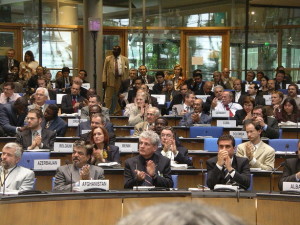2016: A GREAT Year for Green—My New Year’s Prediction

2016 is going to be a GREAT year for the green world, and the green business world in particular. I thought so even before two developments this past week that make me even more optimistic:
- COP21, the historic climate change agreement signed by 197 countries at the Paris summit, will cause pressure from governments and their citizens
- The US has extended the tax credit package on solar and wind (slated to expire at the end of 2016) for five years—adding as much as 39 gigawatts of clean energy
Add in the widely spreading understanding in the business world that going green the right way slashes costs, boosts revenues, and generates profit, and it’s not surprising that 2016 will be a year of great progress. (If you don’t yet see the connection, order a copy of my new book, Guerrilla Marketing to Heal the World. It’s got hundreds of examples ranging from Fortune 100 to solopreneurs.)
Expect to see lots more high-level research, looking for holistic steps that create big jumps in energy efficiency and big reductions in waste. Already, we’ve made amazing technological leaps within just the past couple of years. I’ll name two among hundreds:
- Approaches like biomimicry—modeling how nature solves complex problems—will let sustainability ripple through the whole culture, relatively rapidly.
- Electrical storage (a major restraint on renewable energy growth) has made huge strides, including the vaunted Tesla battery systems.
All is not sunshine and roses, of course. The Act of Congress that extended the clean-energy tax credits also opened up the door for some of the worst kind of carbon-intensive development: exporting the dirtiest types of fossil fuel energy. Public pressure—activism in the streets, in the boardrooms, and in the halls of legislative power—must hound every proposal to put in fracking, use or transport tar-sands oil, build unnecessary pipelines, etc.
One key meme has to be “honor the commitments we made at COP21.”
If the business community, especially, makes it clear that it expects the US to do its part in meeting the targets, and that exporting fossil fuels across oceans will work against this, that open door may stay largely unused. But it will take vigilance.
One not-so obvious trend
The above predictions are relatively mainstream in the green world, even if they appear startling to those outside of it. Let me conclude with a much more “out-there” proposition:
Businesses will go beyond merely going green. Sustainability will be seen as a first step. More and more companies will be going beyond sustainability to create a world where hunger and poverty turn into sufficiency, war into peace, and catastrophic climate change into planetary balance.
Why? Because they will see enormous profit opportunities, and because it feels so much better to oneself, employees, neighbors, suppliers and other stakeholders to see making the world better as a key success metric. How? I wrote a whole book to answer that question.


